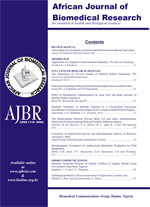
|
African Journal of Biomedical Research
Ibadan Biomedical Communications Group
ISSN: 1119-5096
Vol. 13, No. 1, 2010, pp. 1-7
|
 Bioline Code: md10001
Bioline Code: md10001
Full paper language: English
Document type: Research Article
Document available free of charge
|
|
|
African Journal of Biomedical Research, Vol. 13, No. 1, 2010, pp. 1-7
| en |
A Survey of Antimalarial Drug Use Practices among Urban Dwellers in Abeokuta, Nigeria
Omole, M. K & Onademuren, O. T
Abstract
Drug-use pattern of anti-malarial has been associated with development of resistant strain and therapeutic
failure. This descriptive cross-sectional study was carried out to assess anti-malarial drug-use practices among dwellers of
Adigbe communities within Abeokuta environment. The study documented the knowledge, the attitude and behaviour of three
hundred and fifty (350) respondents in terms of drug preference, attitude to drug use and the effects of non-compliance to antimalarial
drug. Structured questionnaires were used for data collection, as total of 370 questionnaires were distributed and 350
questionnaires were retrieved for analysis. One hundred and twenty five (125) (35.71) of the respondents frequently
experienced malaria attack and practiced self-medication. One hundred and fifteen (115) (32.86%) of the respondents treated
their malaria episode with Sulphadoxine-Pyrimethamine (SP) combination while 90 (25.71%) of the respondents frequently
purchased Artesunate as monotherapy for malaria treatment due to cost-implication of the newer and available Artemisinin
combination therapy (ACT’s). The finding reveals that 43 (12.29%) of the respondents only purchased Artemisinin-
Combination Therapy (ACTs). One hundred and eight can 118 (33.71%) of the respondents practiced self-medication with
anti-malarial drug. The results revealed therapeutic failure to conventional use of Sulphadoxine-Pyrimethamine (SP) by the
respondents as One hundred and thirty nine (139) (33.71%) of the respondents experienced no cure and have to repeat the
treatment with anti-malarias. If drug-use pattern of anti-malarials is not monitored, there is possibility of early emergence of
resistance to the highly effective anti-malarial drugs presently in use..
Keywords
Drug use Pattern, Antimalaria, Monotherapy
|
| |
© Copyright 2010 - Ibadan Biomedical Communications Group
|
|
